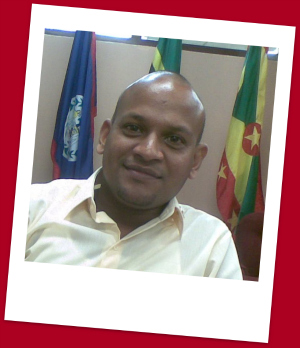Correspondence: Guyanese govt and protestors tackle national youth policy
March 5Young people in Guyana unhappy with national youth policy held talks this week with government officials. Mark Ross, a 27-year-old from Georgetown, reports.
 Two Guyanese youths – Abbas Hamid and Tamika Elious – this week gathered outside the Ministry of Culture, Youth and Sports on the capital’s Main Street to raise their concerns over National Youth Policy.
Two Guyanese youths – Abbas Hamid and Tamika Elious – this week gathered outside the Ministry of Culture, Youth and Sports on the capital’s Main Street to raise their concerns over National Youth Policy.
The two had never met before, but shared one common interest. This was that they were both successful in discussing youth policy with the Permanent Secretary, Alfred King, and the Director of Youth, Carl Brandon.
The two bore placards expressing their disappointment at alleged wastage of public money. One placard read: “Australian consultant fired.. we can be consultants”.
Guyana is the only country in CARICOM that does not have a National Youth Policy. The Peoples Progressive Party civic administration, on assumption to office in 1992, disbanded the national service, which was a programme of the Peoples National Congress and promised the Guyanese a National Youth Policy.
This promise was again made in 2006 in the PPP manifesto, on page 26, under the caption “Youth Policy”, which read: “Revise the National Youth Policy, the Re-organisation of the National Youth Commission with more active regional affiliates…” To date, the policy has not been made a reality.
Over the last few years there have been consultations with young people on the development of youth policy but, according to Abbas, the policy should not be developed using the outcomes of previous consultations, since the issues faced by young people have changed.
He outlined the issue of migration, use of alcohol and drugs, violence and crime and the issue of pornography in schools, which was not seen as a problem a few years ago.
The two lads came out of the Ministry smiling as they were bearers of good news. When asked what was the result of the meeting the two informed this writer that they were told that the Ministry has in its mandate for this year consultations with young people across Guyana and a final draft of the National Youth Policy, for which the Ministry has received funding from UNICEF.
When asked about next steps, they said that they will be following up with the Ministry of Youth on the issue of the observance of International Year of Youth which Guyana has not yet officially launched.
To this they added the issue of non-active CARICOM Youth Ambassadors for Guyana, the absence of Commonwealth Youth Observers/Ambassadors for Guyana, the formation of a National Youth Commission, and the absence of a Youth Commissioner for the Ethnic Relations Commission.
Other issues include writing to the Ethnic Relations Commission about the absence of a Youth Commissioner and the Ministry of Education to withdraw its policy decision to promote failing students.
Note: The opinions and statements expressed are those of the author alone and do not represent the view of the Commonwealth Youth Programme



